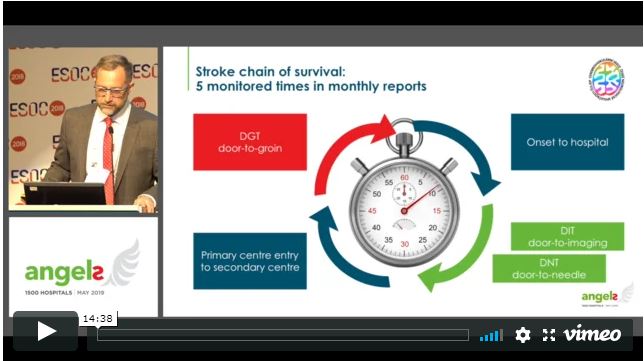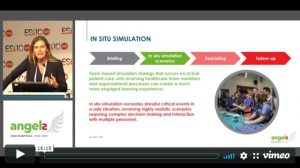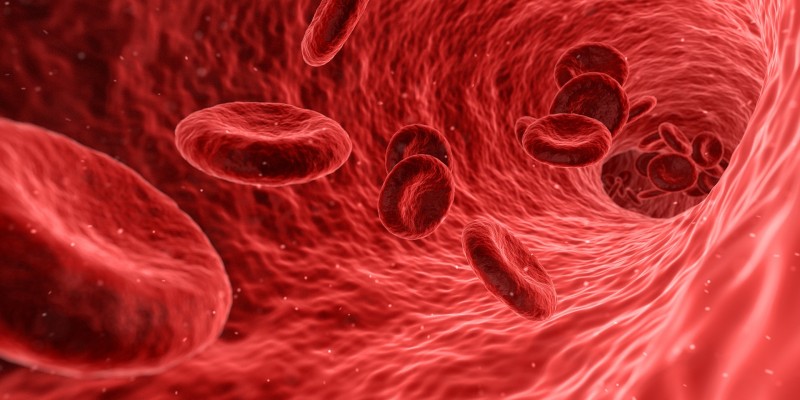
Jun 20, 2018
First appeared on oruen.com
Every 30 minutes a stroke patient who could have been saved, dies or is permanently disabled, because they were treated in the wrong hospital.
Angels Initiative is building a global community of stroke centers and stroke-ready hospitals, working every day to improve the quality of treatment for every stroke patient.
The goal is to get 1500 stroke-ready hospitals around the world by May 2019.
Please click on the photo bellow to access the series of the Angels ESOC 2018 symposium videos:

For more information about Angels Initiative, please visit www.angels-initiative.com

Jun 19, 2018
First appeared on ScienceDaily.com
For every three individuals who have had a stent implanted to keep clogged arteries open and prevent a heart attack, at least one will experience restenosis — the renewed narrowing of the artery due to plaque buildup or scarring — which can lead to additional complications.
Now, a team led by UBC electrical and computer engineering professor Kenichi Takahata has developed a type of “smart stent” that monitors even subtle changes in the flow of blood through the artery, detecting the narrowing in its earliest stages and making early diagnosis and treatment possible.
“We modified a stent to function as a miniature antenna and added a special micro-sensor that we developed to continuously track blood flow. The data can then be sent wirelessly to an external reader, providing constantly updated information on the artery’s condition,” said Takahata.
The device uses medical-grade stainless steel and looks similar to most commercial stents. Researchers say it’s the first angioplasty-ready smart stent — it can be implanted using current medical procedures without modifications.
Research collaborator Dr. York Hsiang, a UBC professor of surgery and a vascular surgeon at Vancouver General Hospital, noted that monitoring for restenosis is critical in managing heart disease.
“X-rays such as CT or diagnostic angiograms, which are the standard tools for diagnosis, can be impractical or inconvenient for the patient,” said Hsiang. “Putting a smart stent in place of a standard one can enable physicians to monitor their patient’s health more easily and offer treatment, if needed, in a timely manner.”
The device prototype was successfully tested in the lab and in a swine model. Takahata, who holds patents for the technology, says his team is planning to establish industry partnerships to further refine the device, put it through clinical trials and eventually commercialize it.
Story Source: University of British Columbia. “‘Smart stent’ detects narrowing of arteries.” ScienceDaily. ScienceDaily, 19 June 2018. <www.sciencedaily.com/releases/2018/06/180619123000.htm>.

Jun 11, 2018
First appeared on ScienceDaily.com
Stroke is the most common cause of adult disability. This is due not only to the high incidence of stroke, but also because spontaneous recovery is often incomplete and no drugs are available that hasten recovery.
Mesencephalic astrocyte-derived neurotrophic factor MANF is neuroprotective when administered before experimental stroke in rats.
A massive immune response mediated by activated microglia and macrophages occurs in the rat brain tissue after stroke. MANF has also recently been shown to recruit immune cells to the eye after retinal damage and to mediate retinal repair after photoreceptor transplantation.
Dr. Mikko Airavaara and his group at the University of Helsinki, Institute of Biotechnology administered MANF to rats after the ischemic brain injury, either by injecting recombinant MANF protein or by delivering a MANF-expressing viral vector into the brain area adjacent to the lesion.
When MANF was administered directly into brain tissue 2 to 3 days after stroke, it did not affect lesion volume but promoted reversal of stroke-induced behavioural impairments. “This indicated that MANF had an effect on the recovery of brain tissue function after injury,” says Dr. Kert Mätlik, the lead author of the study.
MANF treatment transiently increased the number of phagocytic macrophages close to the ischemic lesion. These cells are the professional cleaning crew that clears dying cells and dead material from injured tissue. “This really got me wondering if some of the inflammation is beneficial. What if facilitating specific branches of the inflammatory response enhances both tissue repair and functional recovery?” asks Mikko Airavaara.
By virtue of the presence of a skilled neurosurgeon, Dr. Kuan-Yin Tseng in the lab and a collaboration with Dr. Maria Lindahl, the researchers were also able to study the outcome of experimental stroke in mice that lack MANF in their brain cells. These additional experiments revealed the neuroprotective effect of endogenously-produced MANF against ischemic injury.
Mikko Airavaara has found the results very encouraging for pursuing the ultimate goal of combating long-term disability in stroke patients: “All in all this is a proof-of-concept study that shows the beneficial effect of MANF treatment on the reversal of stroke-induced behavioural deficits. It suggests that MANF or therapeutic agents with similar activity could be developed to repair brain tissue after stroke. However, much more work is needed before clinical studies can be considered.”
Story Source: University of Helsinki. “Post-stroke delivery of neurotrophic factor MANF promotes functional recovery in rats.” ScienceDaily. ScienceDaily, 11 June 2018. <www.sciencedaily.com/releases/2018/06/180611133731.htm>.

Jun 8, 2018
First appeared on ScienceDaily.com
More than 2.5 million Americans are living with Atrial Fibrillation (AFib). AFib is an irregular heartbeat that can lead to blood clots, stroke, heart failure and other heart-related complications.
What doctors and researchers currently understand about treating AFib stems mainly from whether a patient has been diagnosed with the condition or not. University of Minnesota researchers are urging the medical community to take a closer look, specifically at AFib burden.
AFib burden refers to the amount of AFib that an individual has. The goal of the scientific statement published in the American Heart Association’s journal Circulation is to increase knowledge and awareness by healthcare professionals of effective, state-of-the-art science related to the causes, prevention, detection, management, and future research needs related to AFib burden.
“We hope to bring awareness to this concept of measuring the AFib burden and then to outline what we know about it,” said Lin Yee Chen, MD, MS, tenured associate professor, Department of Medicine at the University of Minnesota Medical School, “the hope then is to use that knowledge so more research can be done to fill in those gaps.”
AFib is associated with an elevated risk of stroke, and this statement also pushes for more research to refine risk classifications for stroke. Further understanding the relationship between AFib pattern or burden and stroke risk might result in deeper insights into stroke prevention.
“We could see an enormous benefit to our patient population once these standards are applied. And now is the time to do so,” said Chen.
Story Source: University of Minnesota Medical School. “A deeper understanding of AFib could lower risk.” ScienceDaily. ScienceDaily, 6 June 2018. <www.sciencedaily.com/releases/2018/06/180606143719.htm>.

Jun 7, 2018
A massive and extremely slow change in electrical potential is evidence of irreparable damage
First appeared on ScienceDaily.com
Researchers from Charité — Universitätsmedizin Berlin have analyzed the underlying electrophysiological indicators of subarachnoid hemorrhage, the second most common type of brain hemorrhage that can lead to ischemic stroke within a matter of days. Their findings, which have been published in the journal Brain, may lay the foundations for new stroke treatments.
Subarachnoid hemorrhage is a type of brain bleed that occurs in the area between the membranes surrounding the brain. Patients with subarachnoid hemorrhage can develop complications within approximately one week. Between one in three and one in four patients will develop symptoms of ischemic stroke, a type of stroke caused by an inadequate blood supply. This phenomenon occurs as the result of mechanisms triggered by the molecular breakdown products of the patient’s earlier hemorrhagic stroke. It sets off a wave of electrochemical depolarization, or ‘spreading depolarization’, within the brain tissue. Affected areas of the brain require large amounts of energy in order to restore normal conditions.
In healthy brains, this depolarization of nerve cells is linked to blood supply, meaning blood vessels widen in areas of the brain that are active. However, a subarachnoid hemorrhage may disrupt the signaling cascades between nerve cells and blood vessels, so that the depolarization of nerve cells causes extreme constriction of the blood vessels, which leads to spreading ischemia. Deprived of energy, the nerve cells are incapable of restoring normal electrochemical gradients. If depolarization persists for too long, affected nerve cells will begin to die off. Measurements of the electrical brain potential will then show an extreme and very gradual change , a process known as ‘negative ultraslow potential’, which is indicative of ‘terminal spreading depolarization’.
“Two months ago, we were able to show for the first time that terminal spreading polarization occurs in humans — namely in patients who had suffered cardiac arrest. Now we have been able to show that it also occurs in patients with cerebral infarctions after subarachnoid hemorrhage,” explains Prof. Dr. Jens Dreier of Charité’s Center for Stroke Research Berlin (CSB). Prof. Dreier and his team analyzed data from 11 patients, comparing their findings with results obtained from animal experiments. The waves of depolarization observed indicate disturbances of energy metabolism. The ‘negative ultraslow potential’ constitutes the electrophysiological correlate of infarction, and of tissue death due to an inadequate supply of blood.
Prof. Dreier emphasizes: “Measurements of spreading depolarization may prove as important to the development of interventions for patients with stroke, global ischemia and traumatic brain injury, as similar electrophysiological tools have proved in the past, in the areas of epilepsy or cardiology — because they make the underlying causes visible.”
Story Source: Charité – Universitätsmedizin Berlin. “Electrophysiological sign of cerebral infarction identified: A massive and extremely slow change in electrical potential is evidence of irreparable damage.” ScienceDaily. ScienceDaily, 29 May 2018. <www.sciencedaily.com/releases/2018/05/180529132142.htm>.

Jun 2, 2018
Replacement neurons, blood vessels fill in stroke cavity; gel provides scaffolding
First appeared on ScienceDaily.com
In a first-of-its-kind finding, a new stroke-healing gel helped regrow neurons and blood vessels in mice with stroke-damaged brains, UCLA researchers report in the May 21 issue of Nature Materials.
“We tested this in laboratory mice to determine if it would repair the brain in a model of stroke, and lead to recovery,” said Dr. S. Thomas Carmichael, Professor and Chair of neurology at UCLA. “This study indicated that new brain tissue can be regenerated in what was previously just an inactive brain scar after stroke.”
The results suggest that such an approach may someday be a new therapy for stroke in people, said Dr. Tatiana Segura, a former Professor of Chemical and Biomolecular Engineering at UCLA who is now a professor at Duke University. Carmichael and Segura collaborated on the study.
The brain has a limited capacity for recovery after stroke and other diseases. Unlike some other organs in the body, such as the liver or skin, the brain does not regenerate new connections, blood vessels or new tissue structures. Tissue that dies in the brain from stroke is absorbed, leaving a cavity, devoid of blood vessels, neurons or axons, the thin nerve fibers that project from neurons.
To see if healthy tissue surrounding the cavity could be coaxed into healing the stroke injury, Segura engineered a gel to inject into the stroke cavity that thickens to mimic the properties of brain tissue, creating a scaffolding for new growth.
The gel is infused with molecules that stimulate blood vessel growth and suppress inflammation, since inflammation results in scars and impedes regrowth of functional tissue.
After 16 weeks, stroke cavities in mice contained regenerated brain tissue, including new neural networks — a result that had not been seen before. The mice with new neurons showed improved motor behavior, though the exact mechanism wasn’t clear.
“The new axons could actually be working,” said Segura. “Or the new tissue could be improving the performance of the surrounding, unharmed brain tissue.”
The gel was eventually absorbed by the body, leaving behind only new tissue.
This research was designed to explore recovery in acute stroke, or the period immediately following stroke — in mice, that is five days; in humans, that is two months. Next, Carmichael and Segura are determining if brain tissue can be regenerated in mice long after the stroke injury. More than 6 million Americans are living with the long-term outcomes of stroke, known as chronic stroke.
Story Source: University of California – Los Angeles. “Mice regrow brain tissue after stroke with bioengineered gel: Replacement neurons, blood vessels fill in stroke cavity; gel provides scaffolding.” ScienceDaily. ScienceDaily, 21 May 2018. <www.sciencedaily.com/releases/2018/05/180521131811.htm>.











